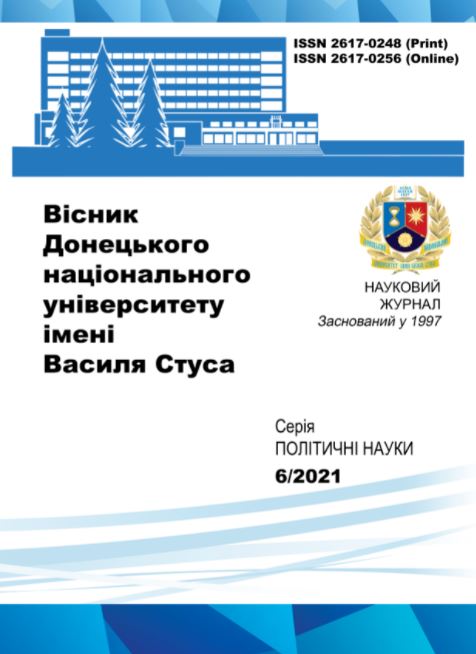Self-governing organizations: evolution formation and theoretical comprehension
DOI:
https://doi.org/10.31558/2617-0248.2021.6.4Keywords:
civil society; public associations; self-governing organizations; self-governmentAbstract
The article analyzes the features of evolution, classification and principles of functioning of self-governing organizations, characterizes the main strategic problematic issues that arise when assessing the role of self-governing organizations in Ukrainian politics, highlights the specifics and basic mutually beneficial conditions of cooperation between the state and self-governing organizations in the modern realities of the development of civil society.
The development of civil society is inextricably linked with the functioning of self-governing organizations, institutionalize in the course of their activities and strengthen the democratic principles of the functioning of society. Self-governing organizations provide a favorable environment for the settlement of social conflicts, unite citizens to solve problems that are important for the population, articulate and aggregate the interests of broad strata of citizens, lobby them in state structures and are a kind of protector of negative informational impact on public opinion. Liberalization of public and political life in the context of globalization is an incentive to increase the influence of self-governing organizations.
The development of relations between the state and self-governing organizations is mutually beneficial and necessary for the development of civil society and the formation of effective principles of cooperation between the public and the authorities, in turn strengthens local government bodies and increases the level of citizens’ involvement in solving local problems. The state and any self-governing organization have a common interest – an interest in the development of a civilized market. Self-governing organizations can exist in parallel with supervisory bodies of state power, and at the request of the latter, in some cases, supervisory functions can be completely transferred to self-governing organizations. The abolition of state control, in this case, is possible only if self-governing organizations meet the principle of compliance with the minimum requirements for them, that is, provided that all subjects of professional activity in society are fully covered.
References
Степанский А. Общественные организации в России. Открытая политика. 1995. № 5 (7). С. 65-68.
Силка О. З. Становлення і діяльність громадських організацій в українському селі наприкінці ХІХ на початку ХХ ст. (на матеріалах Лівобережжя): дис. д. істор. н.: 07.00.01. Черкаський національний університет імені Богдана Хмельницького. Черкаси., 2018. 604 с.
Матвійчук А. В. Громадські організації як чинник становлення громадянського суспільства: дис. к. політ. н.: 23.00.02. Київський національний університет імені Тараса Шевченка. К., 2008. 184 с.
Лойко Л. Типологічне позиціювання національних організацій в індустріальній структурі громадянського суспільства. Політичний менеджмент. URL: http://nbuv.gov.ua/UJRN/PoMe_2005_5_7 (дата звернення: 16.06.2021).
Борейко О. М. Просвітницько-педагогічна діяльність громадських товариств Волині (друга половина ХІХ – початок ХХ ст.). Житомир: Вид-во Житомир. держ. ун-т ім. І. Франка, 2011. 184 с.
Усаченко Л. М. Зарубіжний досвід неурядових організацій: функціональні моделі. Вісник Національної академії державного управління при Президентові України. URL: http://academy.gov.ua/ej/ej11/txts/10ulmofm.pdf (дата звернення: 18.06.2021).
Чарнолуский В. И. Справочная книжка об обществах и союзах. СПб.: Тип. Б. В. Вольфа, 1912. 158 с.
Чернявська Б. В. Адміністративно-правове забезпечення реалізації приватними особами права на свободу об’єднання у громадські організації в Україні: дис. д. філос. (081 Право). Київський національний університет імені Тараса Шевченка. К. 2021. 287 с.
Дітковська С. О. Еволюція радянської концепції громадських організацій. Гуманітарний вісник. URL: http://irbis-nbuv.gov.ua/cgi-bin/irbis_nbuv/cgiirbis_64.exe?C21COM=2&I21DBN=UJRN&P21DBN= UJRN&IMAGE_FILE_DOWNLOAD=1&Image_file_name=PDF/Gvi_2014_21_5(2)__10.pdf (дата звернення: 16.06.2021).
Тесліцький А. М. Класифікація громадських об’єднань в Україні. Науковий вісник Чернівецького університету. URL: http://lawreview.chnu.edu.ua/visnuku/st/559/8.pdf (дата звернення: 17.06.2021).
Алексєєв В. М., Липовська Н. А. Взаємовідносини держави та суспільства. URL: http://www.dridu.dp.ua/biblioteka/doc/Vzayemovidnosyny_derzhavy_ta_suspilstva.pdf (дата звернення: 18.06.2021).
Новохацький В. Д. Неурядові організації як фактор розбудови громадянського суспільства в Україні: автореф. дис. к. політ. н.: 23.00.02. Дніпропетровський національний університет. Дніпропетровськ, 2005. 18 с.
Ващук О. М. Конституційно-правовий статус громадських організацій України: автореф. дис. к. ю. н: 12.00.02. Інститут держави і права ім. В. М. Корецького. К., 2004. 17 с.
Пожидаєв Є. О. Неурядові організації у суспільно-політичному житті України: межі участі та пріоритети діяльності. Стратегічні пріоритети. URL: https://www.libr.dp.ua/text/sp2007_4_3.pdf (дата звернення: 15.06.2021).
Руцинська Т. П. Господарсько-правовий статус громадських організацій. Форум права. URL: http://nbuv.gov.ua/UJRN/FP_index.htm_2016_3_41 (дата звернення: 18.06.2021).
Чернявська Б. В. Значення неурядових (громадських) організації як показника рівня демократії та розвитку громадянського суспільства у державі. Visegrad Journal on Human Rights. URL: https://journals.indexcopernicus.com/api/file/viewByFileId/907944.pdf (дата звернення: 16.06.2021).
Керівні принципи щодо свободи об’єднань / Організація з безпеки та співробітництва в Європі. Проєкт «Координатор проектів в Україні». URL: https://www2.osce.org/files/f/documents/1/2/233076.pdf (дата звернення: 14.06.2021).

